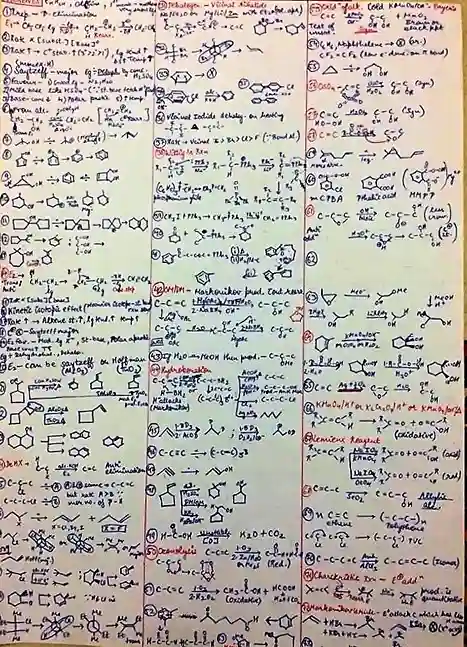
Many NEET aspirants find it difficult to revise Organic Chemistry; a well-structured short note can make revision an easy task.
If you don’t know how to make short notes for Organic Chemistry NEET. You are confused about what you should include and what you should exclude in your short notes.
You have arrived at the right place. This article will teach you what to include in short notes for Organic Chemistry NEET. You will also know from which study material you should make short notes, whether NCERT books, reference books, coaching notes, etc.
Read Also: How to make short notes for Inorganic Chemistry NEET?
Tools needed to make short notes for Organic Chemistry NEET
1. A4 size paper or good quality notebooks: A good quality A4 size paper. If you don’t like A4 size paper, you can also make short notes on notebooks; ensure that the notebooks are of good quality.
2. Colored pens: Use colored pens to make your short notes look visually appealing.
3. Highlighters: Highlighters help you mark critical vital points of a topic. During revision, these highlighted points stand out.
Read Also: How to make short notes for Physical Chemistry NEET?
What you should include In Organic Chemistry short notes?
1. Chemical Formulas: Write the chemical formulas of the essential organic compounds.
2. Structural Representations of Compounds: Include structural representations of the important organic compounds.
3. Name Reactions: Include essential name reactions in your notes
4. Topic Summary: Write the summary of the topic in bullet points.
Read Also: How to make short notes for NEET Physics?
From where do you need to make NEET Organic Chemistry short notes?
1. Class Notes: Prepare short notes from the detailed Organic Chemistry notes provided by your school or coaching institute.
2. NCERT Books: Study a topic or chapter thoroughly from NCERT Chemistry (Organic section) and make short notes.
Read Also: How to make notes from NCERT for NEET?
3. Reference Books: You can make short notes from reference books like Morrison & Boyd, Organic Chemistry Objective by Arihant, etc.
4. Coaching Study Materials: You can refer to the printed study materials provided by your coaching institute to make short notes.
5. Exercise Questions: Include essential questions and their solutions from NCERT books or reference books in your short notes.
6. Tests And Previous Year Questions: Write the questions that you found challenging and their solutions to the mock tests attempted by you. Also, do the same for the previous year’s question
Read Also: Which type of notes are best for NEET?
How to make short notes for Organic Chemistry NEET? – Tips
1. Read And Understand
Before making short notes, please read the chapter or topic once, twice, or thrice until you understand it completely.
You can read from NCERT books, reference books like Morrison & Boyd, coaching study materials, or detailed notes from your Chemistry teacher. You can start making short notes after understanding the chapter or topic properly.
2. Structure Your Notes

As shown in the image above, make three columns in an A4 size page or notebook page. Structure your notes by using headings and subheadings for every topic. Always use bullet points to list critical concepts, chemical formulas, name reactions, etc.
Read Also: How to make short notes for Zoology NEET?
3. Summarize
Study a topic from NCERT books, reference books, coaching study materials, and detailed notes, and write a summary of the topic in short points. Don’t add too many details of a topic in your notes. Avoid writing chemical reaction mechanisms; net chemical reactions are enough..
4. Abbreviations
Use abbreviations wherever possible so that the notes do not become too long. For example, write “OH” for hydroxyl group, write “COOH” for carboxylic acid, etc.
5. Make your notes visually appealing
Colorful notes are easy to read and revise. Use colored pens to make your Organic Chemistry short notes colorful and visually appealing. Write essential chemical formulas, chemical reactions, etc, using colored pens.
6. Practice Questions
Include only essential practice questions and their solutions in your Organic Chemistry short notes. These practice questions can be from books, coaching printed study materials, or detailed notes provided by your coaching institute.
7. Mock Tests & PYQs
Write the questions and their solutions that you feel are important from the mock tests you attempted. Also, note down previous year questions (PYQs) in your Organic Chemistry short notes that you find difficult to solve.
8. A chapter should have one or two pages
When you make Organic Chemistry short notes, ensure a chapter has one or two pages. A chapter should have at most two pages.
9. Highlight
Mark critical points of a topic using a highlighter. Also, mark structural representations of essential compounds, exercise questions, mock test questions, or PYQs. Highlighted content that you find challenging will be beneficial in revision.
Read Also: How to make short notes for Botany NEET?
Conclusion
Many NEET aspirants find Organic Chemistry very challenging, but it is also one of the highest-scoring subjects in NEET. Ignoring Organic Chemistry is a bad idea.
Revising Organic Chemistry from books or detailed notes can be difficult for some students. A concise and well-structured notes makes Organic Chemistry revision easy.
Avoid putting too many details in your short notes, as it makes the notes too long. Write the critical concepts of a topic in bullet points.
Try to use abbreviations wherever possible. With the help of colored pens and highlighters, make your notes visually appealing.
One of the advantages of preparing short notes is that while preparing short notes, you are also revising the topic or chapter.
Lastly, I would like to say that you start preparing short notes after you have completed and understood a chapter or topic. Don’t make short notes without understanding the topic.
Read Also: Is it important to make notes for NEET?
Frequently Asked Questions
Q1. Should I make short notes of Organic Chemistry for NEET?
Revising Organic Chemistry from NCERT books, reference books, or detailed notes can be difficult for some students. It is highly advisable that you make short notes for Organic Chemistry NEET.
Q2. Should I include named reactions in Organic Chemistry short notes for NEET?
Yes, named reactions are very crucial for an exam like NEET.
Q3. Should I include PYQs in Organic Chemistry short notes for NEET?
Yes, include those PYQs that are difficult to solve and are asked repeatedly in the NEET exam.
Q4. When should I start making short notes for Organic Chemistry NEET?
Read a chapter or topic until you understand it, and then you can start making short notes for that topic or chapter.
Q5. Can I buy NEET Organic Chemistry short notes?
Yes, NEET Organic Chemistry short notes can be bought from e-commerce websites like Amazon.
Q6. Should I include every detail in my NEET Organic short notes?
No, only include critical information, chemical structures, name reactions, etc. Excessive information is unnecessary for short notes.
Download: Inorganic Chemistry Short Notes